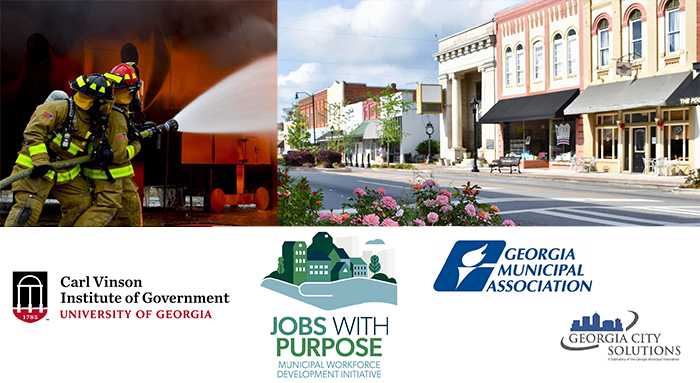
Writer: Margaret Blanchard
Local governments across the country are having trouble finding employees, but for cities in Georgia help is on the way.
The UGA Carl Vinson Institute of Government has teamed up with the Georgia Municipal Association (GMA) and its subsidiary, Georgia City Solutions, to form Jobs With Purpose, a municipal workforce initiative.
The initiative started with a needs assessment by the Vinson Institute that shows more than 85% of municipalities were having trouble recruiting qualified candidates, and half were expecting a skills shortage in the coming months.
The news made Emily Beeman, the human resources director for the City of Tifton, feel less alone.
“Knowing other local government entities are struggling to find talented applicants in police, finance, and landfill areas eased the burden,” Beeman said. “But it also made clear that the resources we use to recruit need to be tweaked or completely reinvented to attract talent.”
An advisory council of local municipal government representatives like Beeman and statewide stakeholders — including partners from the Georgia Department of Education, the Technical College Association of Georgia and the University of Georgia — is leading the Jobs With Purpose initiative. The needs assessment will help the advisory council craft a workforce development strategy for Georgia municipalities.
“It’s important for local governments to proactively seek solutions to grow the talent pipeline,” said Greg Wilson, a faculty member at the Vinson Institute, a UGA Public Service and Outreach unit. “Jobs With Purpose identifies human resource issues that elected officials and administrators can address to ensure they have a sustainable, high-quality workforce.”
For example, the study found that flexible work options are not common in Georgia municipalities. Wages are also less competitive and recruitment is handled through a traditional blend of social media, online advertising and employee referrals.
The report also found that municipal government workers tend to be slightly older than the U.S. average of 42 years. However, the turnover rate of city government workers in Georgia is much lower than the national average.
That finding resonated with Beeman, who noted that when older employees retire, so does their institutional knowledge, leaving organizations struggling to find comparable replacements.
“If we want to keep up with the private sector, we must change our practices to attract more qualified candidates. Understanding what other entities are doing and staying abreast of trends in the workforce will help in better planning,” she said.
Fellow advisory council member and Brunswick City Manager Regina McDuffie said Jobs With Purpose highlights the need for cities to invest in what keeps them moving: people.
“We are a labor-driven industry, and no level of automation can fully guide our services,” she said. “We rely heavily on the productivity of our workforce; having proper resources is critical to our viability and sustainability.”
The needs assessment fulfilled the first phase of the Jobs With Purpose initiative. In the second phase, the advisory council will use findings from the needs assessment to develop strategies in planning, investment opportunities and training. An update is expected at the Georgia Municipal Association’s Annual Convention in late June.
View the Municipal Workforce Survey Data Report.
Key TakeawaysThe Jobs With Purpose needs assessment offered nine key takeaways on the municipal workforce in Georgia:
|